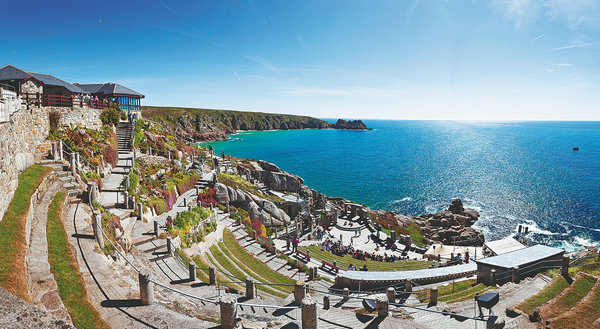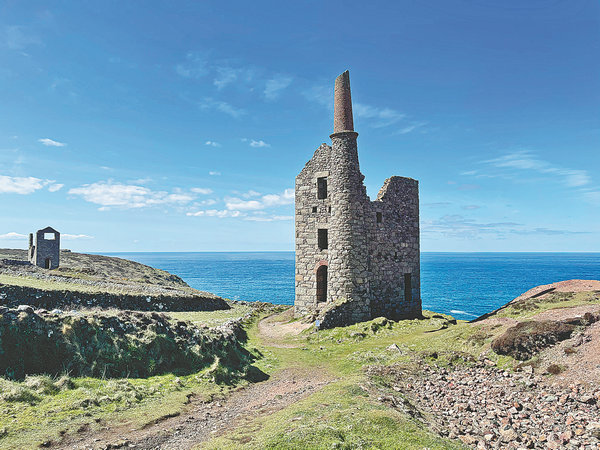
Minack Theater is a magnificent open-air space built by Cornwall native Rowena Cade. [Photo provided to China Daily]
"Dreckly" is one of the first words that you're likely to hear in Cornwall. It is an expression that means "things will get done when they get done"-a fitting reflection of the rhythm of Cornish life. Almost everything in Cornwall moves at an easy pace, although its people are serious when it comes to scones. Jam first!
Although it sounds innocent, this is a hotly contested battle involving one of Britain's most iconic sweets. The Cornish insist that jam must first coat the scone, before being topped with lashings of rich, clotted cream, whereas their neighbors in Devon believe that cream should precede the jam.
"Jam first, because it sticks really well to the scone. Also, when you take your first bite, you avoid a direct sugar hit from the jam, and the richness of the cream creates an optimal experience for the palate," said local tour guide Louise West, who runs the travel company Experience Cornwall Tours.
In her tours, she enjoys taking her clients for a traditional Cornish cream tea picnic with home-baked scones at Cornwall's most iconic landmarks.
Scones aside, there is much more to this region of England, which boasts majestic granite mountains, sweeping green landscapes spotted with wildflowers, dramatic coastlines, surfer-friendly waves, and imposing, historically rich tin and copper mines.
For British people, Cornwall has always been a popular seaside escape. It isn't uncommon for Londoners to have cottages or summer homes in St Ives, for instance, but the COVID-19 pandemic has caused the popularity of the region to soar.
According to a local, on the first day when lockdown was lifted and British people could travel domestically again, the population in certain areas of Cornwall doubled. Accommodation prices followed suit, increasing by nearly 30 percent as new eager remote workers from cities across the country sought out gardens, larger living spaces and a more leisurely pace of life.
Cornwall's profile as an internationally sought-out destination received a big boost during the G7 Summit in 2021. There was a huge web traffic spike on Cornwall from countries all around the world during the summit, according to Malcolm Bell, chief executive of Visit Cornwall.
The world was captivated by images of British Prime Minister Boris Johnson hosting world leaders and dignitaries at breathtaking beachfront barbecues at Carbis Bay, which has nearly a mile of golden sand that was listed as one of the world's finest by the Most Beautiful Bays in the World Organization.
"In addition to London, Cotswolds, Scotland, Cornwall is now on the wish list of destinations to visit when people come to the United Kingdom," Bell said.

Botallack mines give a captivating insight into Cornish mining history. [Photo by Wang Mingjie/China Daily]
Newquay
Located on the north coast of Cornwall, Newquay is widely regarded as the UK's surfing capital. It has the only commercial airport in the region, with year-round services from London, Gatwick and Manchester airports taking around an hour.
Catching the waves first became popular in the 1960s, thanks to four young Australian lifesavers who hit the beach with the first fibreglass surfboards in 1962. By the 1970s, people were so "dead-keen" for a surf and boards were in such short supply that an enterprising local funeral home director modified coffin lids as surfing boards. Photos of locals proudly displaying their wooden "boards" on the beach can be seen at the Perranzabuloe Museum in Perranporth.
These days, foam boards have replaced their more macabre predecessors. Thick wet suits and boots can be seen hanging out to dry from balconies, car doors, and rearview mirrors. They're particularly necessary in Cornwall, where the water temperature is not quite as tepid as it is, for example, in Hainan province in China, but that does not stop anyone.
Newquay attracts people of all ages who surf at all levels. The sandy shores, lack of rocks, gentle waves and the abundance of instructors make it ideal for beginners and recreational surfers alike.
Fistral is one of the popular go-to places for surfing in Newquay, thanks to its geography. The area's main west-facing beach that draws in the predominant western swells and winds makes it a reliable spot to catch a wave.
In fact, some of its most frequent visitors often park their caravans along the Newquay Esplanade, overlooking Fistral beach, where they camp out for days and spend most of their time surfing and chilling. Catching a "dawnie", or a dawn surf, is a prized event for those keen to have the ocean all to themselves.
Dave Goodger, who is in his 40s and lives in Oxford, often takes his 11-year-old son to surf in Fistral beach whenever they visit family there. "Here you have got the consistent availability of surfable waves all year around, which is good for casual surfers like me. It does not matter whether you are an amateur or an expert, it is a fantastic feeling to charge into the sea and catch the waves."
Matthew from Perranporth, also in his 40s and who prefers not to give his surname, started surfing at the age of five and views himself as a die-hard surfer. He usually surfs two or three times a week. He said: "Surfing is a 100 percent addictive sports. It is like when you go to the beach, you see the kids playing in the water, they are always happy. Surfing is like adults getting the same feeling."














